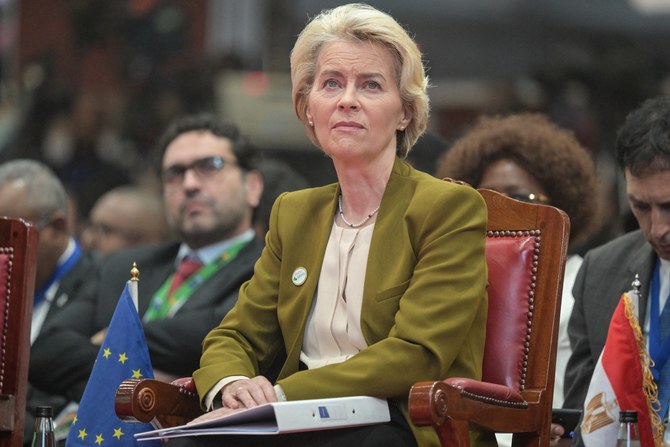Andrew Hammond
European Commission President Ursula von der Leyen will give the most important speech of her career next week, in what could be her last annual “state of the union” address to the EU.
Almost four years into her presidency, the EU faces a crossroads moment in the aftermath of the pandemic and amid the Ukraine war. The array of challenges and opportunities facing the bloc means it is at a potentially historic tipping point between the past and a hopefully brighter new dawn in the second half of the 2020s.
Von der Leyen hopes to lead that future by serving a second term from late 2024, but that will depend upon the political horse-trading that follows the result of next June’s European Parliament elections. Even if she does not serve as European Commission president again, it is possible she may land another big job, with US President Joe Biden reportedly wanting her to serve as the next NATO secretary-general.
When Von der Leyen took office in December 2019, she could not have foreseen that the pandemic and Russia’s invasion of Ukraine would be the decisive challenges of her presidency. Yet they have dominated and it is sometimes now forgotten that COVID-19 nearly forced her resignation as a result of the EU’s bungled initial rollout of vaccines in 2021. For all of the challenges that the pandemic and the Ukraine war have brought, this crisis-type environment is one that the EU has sometimes previously found congenial to clearing the pathway to ever close union. Coming to office during a troubled period for the bloc, he is seen by many as giving the present-day EU a clear sense of direction, including as the founding father of the euro. In his first term from 1985, he rallied the bloc to the call of the single market and, when appointed to a second term, he urged Europeans to embrace the ambitious goals of economic, monetary and political union. While history may not see Von der Leyen’s presidency as being quite so historically important as that of Delors, she has delivered a number of big achievements. For one, von der Leyen played a key role in 2021, alongside then-German Chancellor Angela Merkel and French President Emmanuel Macron, in persuading EU leaders to agree to give the bloc – for the first time in its history – debt-raising powers to finance a €750 billion ($804 billion) post-coronavirus recovery plan to counteract its worst economic shock for decades.
This could be looked back on as a key moment for the EU. At the time, there was even discussion in Brussels of a “Hamiltonian moment,” in reference to Alexander Hamilton, the US treasury secretary who, in 1790, convinced the nascent Congress of the benefits of common debt. Earlier in her presidency, in 2020, Von der Leyen was key to the EU-27 and the UK agreeing a Brexit trade and cooperation deal. While tensions still exist with London, this has provided a potentially workable framework between the parties to try to build a new phase of UK-EU partnership in the years to come, especially now that a revised Northern Ireland protocol has been agreed.
Yet another big achievement was the huge scope of her Green Deal megaproject. This has seen more than 50 major sustainability initiatives rolled out since 2019, as Europe seeks to become the first continent in the world to be climate neutral, with a target date of 2050.Ahead of her big speech next week, Von der Leyen has hinted that she will again focus not only on Ukraine, but also on this green vision for the post-pandemic EU. This will include a big section on climate action, with COP28 on the horizon.
Von der Leyen will therefore reemphasize her belief that it is critical for the bloc, which has a population of more than 400 million, to be ambitious and seize the initiative in the coming years. The alternative, in her view, is further drift of the type that has characterized EU affairs for so long. As well as opportunities on the horizon, there are also risks. Indeed, recent years have seen a huge growth in domestic and external challenges that may be without precedent in the post-Second World War era.
On the domestic front, there has been a significant rise in anti-EU, nationalist sentiment across the continent, which has seen populist arguments coming to the fore, as well as a perceived erosion of the fundamental values of liberal democracy. This is personified by Hungarian Prime Minister Viktor Orban, who enjoys the closest relationship with Russia’s Vladimir Putin of any EU leader and who has, in the last year and a half, stymied a number of key sanctions-related activities against Moscow following its invasion of Ukraine. On the international front, meanwhile, is a new geopolitical reality – and not just from an increasingly assertive Russia. There is also massive uncertainty from the US, with the key 2024 presidential election potentially offering a stark international relations choice between the strong Atlanticist Joe Biden and the pro-Brexit, anti-EU Donald Trump. Von der Leyen’s speech will seek to make clear that the decisions made in late 2023 and 2024 will have a huge role in defining the EU’s longer-term political and economic character in the face of multiple opportunities and challenges, including Ukraine. With storm clouds perhaps gathering again, she is right that there may now be a historic window of opportunity for the continent to forge a stronger, more sustainable path into the future.
Arab News







